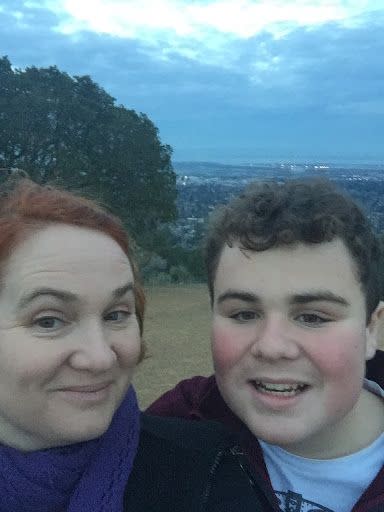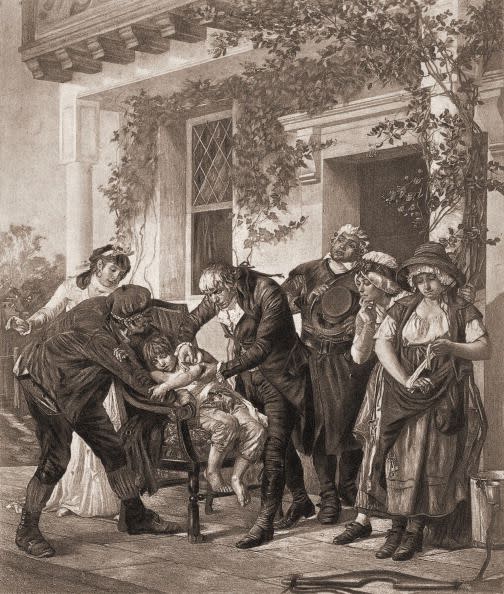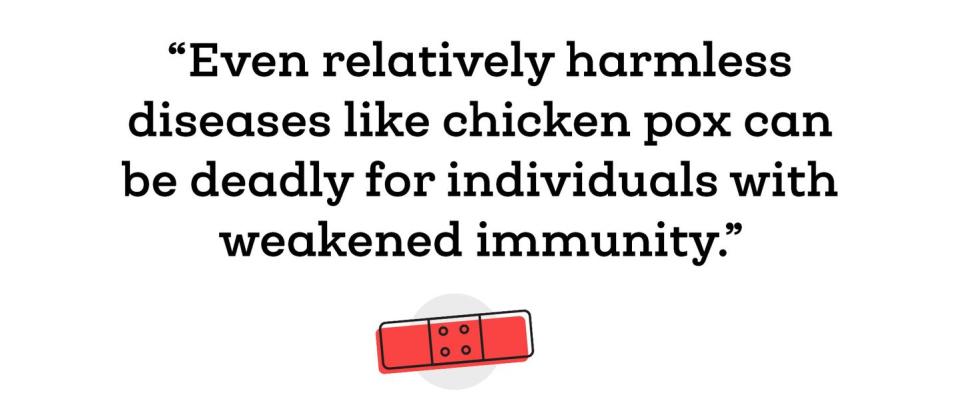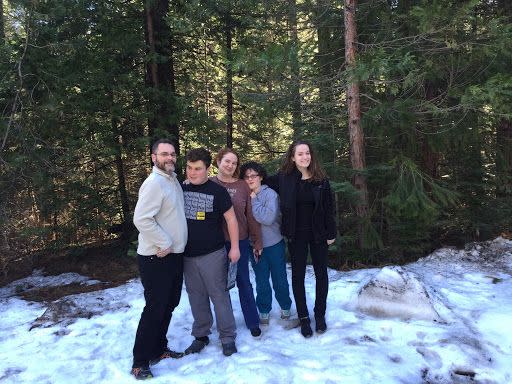I Used to Think Vaccines Caused My Son's Autism — I Was So Wrong

Even though Shannon Des Roches Rosa's 18-month-old son Leo didn't respond to his name when called, she wasn't worried. There were other early benchmarks, ones his older sister had achieved, that he'd missed too, but she chalked it up to differences between siblings. The year was 2003 and, despite living in the progressive San Francisco Bay area, autism wasn't part of the public lexicon like it is today — nor was it screened for or diagnosed as often.
It wasn't until a family vacation with a friend who was a pediatrician that Shannon and her husband first grew concerned about their son's lack of response and "joint attention" (looking where others are looking). By the end of their trip, the friend advised that they should get him checked out. He didn't say "autism," but told Shannon to talk to their pediatrician about what he'd observed. Leo started receiving early intervention services through their local regional medical center, but it took almost another year and a half for an official diagnosis.

Hungry for answers and support, the 33-year-old mom turned to the internet, which was just beginning to take shape. "It was very hard to find information [about vaccines and autism] in the early'00s — most of the info I got was through news, then the emerging parent groups," she says. "All anyone could talk about was how their kids had been 'damaged.'" Shannon soon found herself questioning the safety of vaccines for her children.
Today, more than a decade later, fears around vaccination persist, and disagreement about its effectiveness and necessity continues, despite widespread scientific debunking of an autism-causation link to vaccines. It's been so long since Americans faced the horrors of vaccine-preventable illnesses that we've forgotten what life without vaccines looks like. Polio, the paralysis-causing disease that once affected thousands of people a year in this country, is no longer a threat because of our high level of immunization. If that is compromised, we risk reintroducing an old enemy to children's health, say experts.

That's why the recent mumps outbreak in Washington, which, as of press time, has reached over 500 cases, and California's measles outbreak of 2015 are so alarming. There have already been 1,000 cases reported across the United States in 2017.
"It doesn't take much for our children to start getting these diseases again," says Hansa Bhargava, M.D., WebMD medical editor and staff pediatrician at Children's Healthcare of Atlanta, adding that she vaccinates her own kids and believes every parent should.
Children with allergies to vaccines, and individuals with weak or compromised immune systems, rely on "herd immunity" for protection from disease. "Statistically, there are significant increases in vaccine-preventable diseases during modern times when the numbers of vaccinations in certain areas dropped," says Shikha Jain, M.D., a hematologist and oncologist at Chicago's Northwestern Memorial Hospital. In other words, when everyone else is vaccinated, it provides "indirect protection to those who are unable to receive the vaccine," she says.
Baby Boomers remember people who had polio: Prior to the vaccine's introduction in the mid-1950s, about 15,000 cases were reported annually. With the introduction of the vaccine, that number fell to fewer than 100 cases in the 1960s and fewer than 10 in the 1970s. Now, the CDC reports that there have been no cases of polio that originated in the United States since 1979. Yet, as recently as 1993, the disease was brought into the country by someone who had traveled outside.

Even seemingly innocuous ailments like chicken pox and the flu "can be deadly for individuals with weakened immunity," says Ernest Darkoh, M.D., co-founder of BroadReach, an international organization devoted to global health initiatives. The flu was once responsible for a massive epidemic, between 1918 and 1919, that infected a third of the world's population and killed millions. Americans have become so used to these diseases' insignificant impact nowadays, we have come to rely on it. But with more parents choosing not to vaccinate, that assumption of "herd immunity" may no longer be a safe bet.
Back when Shannon's son was diagnosed with autism, many parents like her were "panicked" by the label, she recalls. What looked like an epidemic was actually a shift in diagnostic criteria: In the late 80s and early 90s, definitions in the Diagnostic and Statistical Manual of Mental Disorders (DSM) used by physicians expanded to include "autism disorder" and "Asperger's Syndrome." More doctors were diagnosing autism because they had a better understanding of the symptoms exhibited by individuals on the spectrum.
Belief that their children had been poisoned "had parents seeking cures instead of supports and understanding," Shannon says. Many latched onto the work of Andrew Wakefield, M.D., a researcher whose 1998 study published in — and later retracted from — The Lancet claimed that the measles-mumps-rubella (MMR) vaccine was to blame for the rise in incidents of autism.
In 2000, in response to growing public fears, vaccine manufacturers removed thimerosal, a preservative used in some flu shots that contains a small amount of mercury which is quickly excreted by the body, from the most common childhood vaccines, even though the vaccine-autism link had been disproven.
Since Wakefield's work was released, others have tried, without success, to replicate his claims. The BMJ (a weekly, peer-reviewed British medical journal) called his study an "elaborate fraud" and stated that the "clear evidence of falsification of data should now close the door on this damaging vaccine scare." Wakefield lost his medical license in May 2010, but the door was not closed.

Overwhelmed parents needed answers, and the anti-vaccine theory provided an easy, readily available explanation. "It was the dominant media message at the time," Shannon says now. She, like many in her situation, paid attention and pushed back.
Opposition to immunization is nothing new. When Edward Jenner, the English physician behind the world's first vaccine, "started to vaccinate people with cow pox to prevent smallpox in the 1880s, wild protest erupted," says Alix Casler, M.D., the head of pediatrics at Orlando Health Physician Associates and assistant professor of pediatrics at Florida State College of Medicine. "Drawings of people who had grown cow body parts represented the fear of vaccination at the time."
While that may seem far-fetched, science has equally disproven the accusations of autism-causation and mercury poisoning through thimerosal. Yet in some circles, these beliefs persist. "The idea that vaccines cause autism remains the biggest and most damaging misconception," says Dr. Darkoh. "Multiple, large scale, and highly rigorous studies have demonstrated the safety of vaccines." He cautions against placing stock in non-scientifically-based evidence found on "fringe or alternative health websites [that are often] based on anecdotes rather than rigorous scientific study."

Slowly, as she started to find more research, Shannon rejected the theory that vaccination had contributed to her son's autism. As she wrote in 2008 blog post explaining why she had chosen to vaccinate Leo's younger sister, "I think his autism is most likely genetics … plus possibly an environmentally-triggered genetic abnormality or mutation." Shannon realized that she needed to focus less on the cause and more on the future. In 2010, she started Thinking Person's Guide to Autism, an organization that raises awareness of autism and offers a wealth of resources and outlets for further education.
Shannon emphasizes the need for open, supportive communication between vaxxers and anti-vaxxers alike. "No one wants to be told they are being jerks when in fact they are scared, and are actually usually craving information that will make them less scared," she says.

Both Shannon and Dr. Casler recommend the book The Panic Virus: A True Story of Medicine, Science and Fear by Seth Mnookin as a thorough source of information. Dr. Casler even suggests giving it as a gift to someone with concerns about vaccination. "Listen to people's concerns and then respond with facts," says Casler.
Shannon's son is now 16 and, she says, "doing great." He likes hiking and family outings, art, and spending time on his iPad. Her younger daughter, who wasn't vaccinated until she was three, is normal and healthy and her older daughter, now in college, is not only pro-vaccination, but concerned with evidence-based science in all areas.
The experts cited here all say that being informed is the best way to understand the importance of immunization. "Slow, steady exposure to good info helps," says Shannon. "I know it helped me."
You Might Also Like
